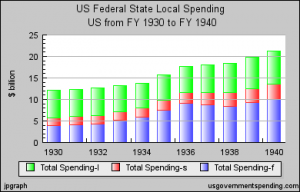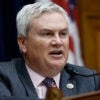Proponents of government spending are fond of citing 1937 as an example of when government implemented sharp austerity, and the economy derailed. This argument is dead wrong.
On Thursday, New York Times columnist Paul Krugman argued that fiscal austerity right now would make our economic crisis worse. “Even if we manage to avoid immediate catastrophe, the deals being struck on both sides of the Atlantic are almost guaranteed to make the broader economic slump worse,” writes Krugman. As his proof, he offers that “if the negotiations succeed, we will be set to replay the great mistake of 1937: the premature turn to fiscal contraction that derailed economic recovery …”
Likewise, in Cleveland Park, Maryland, while speaking about debt negotiations, President Obama made the same erroneous claim. According to Daily Kos, Obama explained how in 1937 FDR cut spending after the launch of the new deal, leading to economic dip. “We’ve got to be careful that any efforts we have to reduce the deficit don’t hamper the economic recovery,” Obama said.
But both Professor Krugman and President Obama have their history entirely incorrect. Total government spending never decreased in the 30s, certainly not after 1937. Rather, total government spending went up:

Heritage economist Bill Beach adds that then-Secretary of Treasury Henry Morgenthau, in 1939, after seven years of New Deal spending, noted, “We have tried spending money. We have spent more than we have ever spent before and it does not work.”
In fact, not only does history deny their narrative, but, as the New York Times pointed out, many recent studies have actually found that spending cuts propel economic growth:
Recent studies, however, have found the opposite: Countries that rely primarily on spending cuts tend to experience less economic pain in the short term. Moreover, in some cases, the cuts seem to spur faster growth.
The monetary fund study reported that a 1 percent fiscal consolidation achieved primarily through tax increases reduced economic activity by 1.3 percent over two years, while an identical consolidation driven primarily by spending cuts reduced activity by 0.3 percent.
Fortunately, the American public disagrees with Dr. Krugman and President Obama, but agrees with conservatives that spending cuts now wouldn’t hurt our economy, but would help it.





























